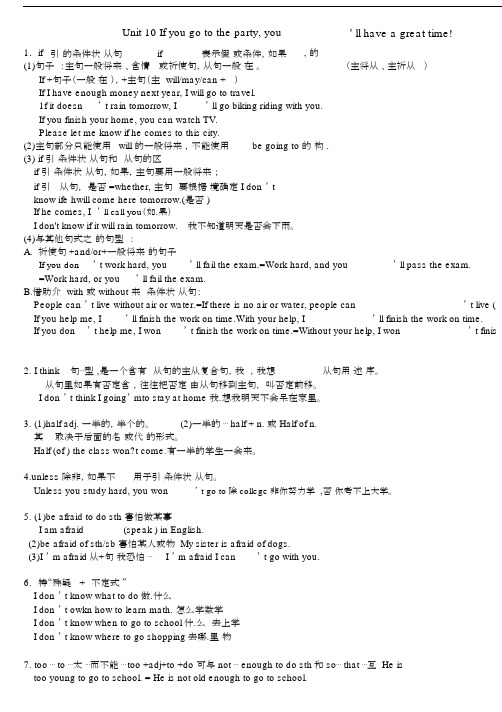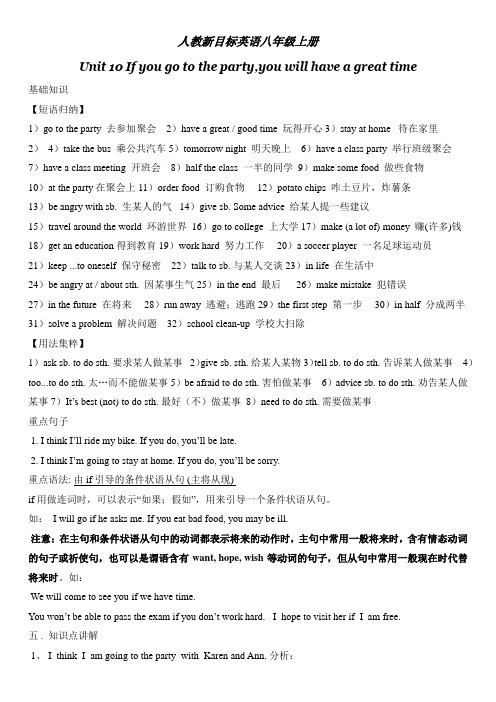新版新目标英语八年级上册unit10知识点总结
人教版新目标八年级英语上册unit10单元知识点汇总

人教版新目标八年级英语上册unit10单元知识点汇总一...经典讲解1.连词if,when,unless,after,before,when,assoonas,aslongas(只要)引导的从句一般为一般现在时,主句用一般将来时If引导条件状语从句‘如果’主句为一般将来时或祈使句或含有情态动词,从句为一般现在时(主将从现)if从句可前可后If引导宾语从句‘是否’一般位于主句后Idon’,Iwon’穿牛仔裤去聚会stayathome待在家takeabustotheparty乘车去聚会halftheclass一半的同学watchavideo观看影碟potatochips炸薯片half---halvesI’mnotsure….我不确定…保守秘密getenoughexercise得到足够的锻炼makealotofmoney赚大量的钱travelaroundtheworld 环游世界getaneducation得到教育thesocceragent足球经纪人makecarelessmistakes犯粗心的错nswerthequestion回答问题helpalot帮忙许多solvetheproblem解决问题saysorrytosb.跟某人道歉agreewithsb.同意某人.与某人讨论某事visitanoldpeople’shome拜访养老院thesedays这些天sendyoualetter寄给你一封信writedown记下each/everyday每一天intheend最后inthefuture 在未来firststep第一步studyforanEnglishexam为英语考试而学习haveagreat/goodtime,havefun,enjoyoneself玩得开心haveenoughtimetodo有足够的时间做某事talktootherpeople/others与其他人交谈getintofightwithmyparents与我父母大吵Theworstthingistodonothing.最糟糕的事是什么都不做。
(完整word版)新版新目标英语八年级上册unit10知识点总结.docx

Unit 10 If you go to the party, you’ ll have a great time!1. if引的条件状从句if表示假或条件,如果, 的(1)句子:主句一般将来、含情或祈使句,从句一般在。
(主将从、主祈从)If +句子(一般在),+主句(主 will/may/can + )If I have enough money next year, I will go to travel.1f it doesn’ t rain tomorrow, I’ ll go biking riding with you.If you finish your home, you can watch TV.Please let me know if he comes to this city.(2)主句部分只能使用will 的一般将来,不能使用be going to 的构 .(3)if 引条件状从句和从句的区if 引条件状从句,如果,主句要用一般将来;if 引从句,是否 =whether, 主句要根据境确定 I don ’ tknow ife hwill come here tomorrow.(是否 )If he comes, I’ ll call you(如.果)I don't know if it will rain tomorrow.我不知道明天是否会下雨。
(4)与其他句式之的句型:A.祈使句 +and/or+一般将来的句子If you don’ t work hard, you’ ll fail the exam.=Work hard, and you’ ll pass the exam.=Work hard, or you’ ll fail the exam.B.借助介 with 或 without 来条件状从句:People can ’ t live without air or water.=If there is no air or water, people can’ t live ( If you help me, I’ ll finish the work on time.With your help, I’ ll finish the work on time.If you don’ t help me, I won’ t finish the work on time.=Without your help, I won’ t finis2. I think句⋯型,是一个含有从句的主从复合句,我,我想从句用述序。
人教新目标英语八年级上册Unit10重难点知识讲解+练习题(无答案)

人教新目标英语八年级上册Unit 10 If you go to the party,you will have a great time基础知识【短语归纳】1)go to the party 去参加聚会 2)have a great / good time 玩得开心 3)stay at home 待在家里2) 4)take the bus 乘公共汽车 5)tomorrow night 明天晚上 6)have a class party 举行班级聚会7)have a class meeting 开班会 8)half the class 一半的同学 9)make some food 做些食物10)at the party 在聚会上 11)order food 订购食物 12)potato chips 咋土豆片,炸薯条13)be angry with sb. 生某人的气 14)give sb. Some advice 给某人提一些建议15)travel around the world 环游世界 16)go to college 上大学 17)make (a lot of) money 赚(许多)钱18)get an education 得到教育 19)work hard 努力工作 20)a soccer player 一名足球运动员21)keep ...to oneself 保守秘密 22)talk to sb. 与某人交谈 23)in life 在生活中24)be angry at / about sth. 因某事生气 25)in the end 最后 26)make mistake 犯错误27)in the future 在将来 28)run away 逃避;逃跑 29)the first step 第一步 30)in half 分成两半31)solve a problem 解决问题 32)school clean-up 学校大扫除【用法集粹】1)ask sb. to do sth. 要求某人做某事 2)give sb. sth. 给某人某物 3)tell sb. to do sth. 告诉某人做某事 4)too...to do sth. 太…而不能做某事 5)be afraid to do sth. 害怕做某事 6)advice sb. to do sth. 劝告某人做某事 7)It’s best (not) to do sth. 最好(不)做某事 8)need to do sth. 需要做某事重点句子1. I think I’ll ride my bike. If you do, you’ll be late.2. I think I’m going to stay at home. If you do, you’ll be sorry.重点语法: 由 if 引导的条件状语从句 (主将从现)if 用做连词时,可以表示“如果;假如”,用来引导一个条件状语从句。
最新人教版新目标八年级上册英语Unit10单元知识点归纳

2013版新目标八年级英语上册Unit10单元知识点归纳及单元测试题(附答案)命题人:陈河初中简红斌一、重点单词:organize upset travel teenager normal unless certainlyunderstanding careless trust experience else二、重点词组:1.have a good/great/wonderful time=have fun=enjoy oneself2.stay at home3. watch a video4.order food from a restaurant5. too lazy to cook6. study for my English exam7. get enough exercise8. have enough time to study9. make friends with sb. 10.travel around the world 11. go to college 12. be famous for 13. make a lot of money 14. get an education 15. give sb. some advice16. get advice from an expert 17. have problems with sb./sth. 18. keep sth. to oneself 19. ask sb. to be more careful 20. run away from our problems 21. stay out too late22. worry about=be worried about 23. be halfway to doing sth. 24. get into a fight with sb三、重点句型:1. ----What will happen if they have the party today ? ----Half the class won’t come.2. The students are talking about when to have a class meeting.3. If I walk, it will take me too long.4. Problems and worries are normal in life.5. Unless we talk to someone, we’ll certainly feel worse. (=If we don’t talk to someone…,)6. She was afraid to tell her parents about it.7. Her dad said he sometimes made careless mistakes himself.8. I always remember to share my problems in the future!9. It’s best to run away from our problems.10. He thinks the first step is to find someone you trust to talk to.11. Sharing a problem is like cutting it in half.12. Y ou’re halfway to solving a problem just by talking to someone about it.13. Do you ever give advice to your friends about their problems?14. I’ll send you a letter about my experience.四、重点语法:If引导的条件状语从句1. 句子时态:主句为一般将来时、含情态动词的谓语动词或祈使句,从句为一般现在时。
人教版新目标八年级上Unit10知识点背诵与练习(无答案)

Unit10知识点一 have a great time意为“玩得开心;过得愉快”,后跟动词doing形式。
其中great 可以用good 或wonderful代替。
其同义短语有have fun,enjoy oneself,后跟doing形式。
如:They are having a great time in the park.=They are having fun in the park.= They are enjoyingthemselves in the park. 他们正在公园里玩得很开心。
考点训练1.I will have the final exam tomorrow . —____________A.Have a good time. B.Good trip. C.Good luck. D.Good job.2.Did you enjoy yourself at the party. (替换划线部分)A.have a try B.have a big dinner C.have a good time D.have a bad time3.—Have a good time.—________. A.Too bad B.Good idea C.Thank you D.See you4.Frank and his friends had great fun _________volleyball on the beach yesterday.A.play B.playing C.to play5.It is really a great time a trip in the park. We all had a great time kites there.A.to have; to fly B.to have; flying C.having; to fly D.having; flying知识点二 order用法①作动词,意为“订购;订货;点菜”l ordered some clothes from that shop.我从那家商店订购了些衣服②作动词,意为“命令;嘱咐”。
202X年人教版八年级英语上册第十单元知识点总结

千里之行,始于足下。
202X年人教版八年级英语上册第十单元知识点
总结
第十单元主要掌握以下知识点:
1. 情态动词must的用法:表示必须,务必;用于肯定句中,后接动词原形。
2. 情态动词must的否定形式mustn't的用法:表示禁止,不得。
3. 情态动词need的用法:表示需要,后接动词原形,也可用于疑问句和否定句中。
4. have to的用法:表示不得不,必须;后接动词原形。
5. 表示建议的句型:You'd better (not) + 动词原形。
6. 表示能力的句型:be able to + 动词原形。
7. 过去进行时的构成及用法:was/were + 现在分词。
8. 表示过去能力的句型:used to + 动词原形。
9. 表示目标的介词短语:go to + 地点。
10. 表示目的的介词短语:for + 名词/代词 + to + 动词原形。
第1页/共2页
锲而不舍,金石可镂。
11. 详细描述地点的介词短语:in the front of, next to, on the right/left, in the middle, at the end, etc.。
(人教版新目标)八年级英语上册全册各单元知识点期末总复习讲解教学课件

3. feel like “感受到;摸起来”,后跟宾语 从句或名词。 I felt like I was a bird. 我感觉我是一只鸟。 It feels like a stone. 它摸起来像一块石头。
eg.something special; somewhere wonderful. 2.不定代词做主语时,谓语动词用第三人称单数。 eg.Is everybody here? 大家都到齐了吗?
1. get to/reach/arrive 都是“到达“的意思。
get to+sp=reach+sp = arrive at+sp(小)=arrive in+sp(大) 若他们后面要加地点副词here, there, home等,则 不需要加介词。
25、up and down上上下下 26、come up出来 27、enjoy oneself=have fun=have a good time
玩的开心
二、重要句子(语法):
1.Where did you go on vacation? 你到哪里去度假了?
I went to New York City. 我去了纽约城。
三、习惯用法、搭配
1. buy sth. for ab./ buy sb. sth. 为某人买某物 2. taste + adj. 尝起来…… 3. nothing to do but do除了……之外无事可干 4. seem + (to be) + adj 看起来 5. arrive in + 大地方 / arrive at + 小地方 到达某地 6. decide to do sth=make a decision决定做某事 7. try doing sth. 尝试做某事
人教新目标八年级英语上册Unit 1-Unit10全册词汇默写

Unit 1 Where did you go on vacation?Ⅰ. 单词1. __________pron. 任何人2. __________ adv. 在任何地方3. __________ adj. &pron. 不多; 很少4. __________ adj. , adv. &pron. 最多; 大多数5. __________ pron. 某事; 某物6. __________ pron. 没有什么; 没有一件东西7. __________ pron. 每人; 人人; 所有人8. __________ pron. 我自己; 我本人9. __________ pron. 你自己; 您自己10. __________ n. 母鸡11. __________ n. 猪12. __________ v. 好像; 似乎; 看来13. __________ adj. 厌倦的; 烦闷的14. __________ pron. 某人15. __________ n. 日记; 记事簿16. __________ n. 活动17. __________ v. 决定; 选定18. __________ v. &n. 尝试; 设法; 努力19. __________ n. 鸟20. __________ n. 自行车; 脚踏车21. __________ n. 建筑物; 房子22. __________ n. 商人23. __________ n. 顶部; 表面24. __________ v. 等待; 等候25. __________ n. 伞; 雨伞26. __________ adj. 湿的; 潮湿的; 下雨的27. __________ prep. & adv. 在……下面; 到……下面28. __________ adj. & adv. 足够的(地); 充分的(地); 充足的(地)29. __________ adj. 饥饿的30. __________ adv. 像……一样; 如同conj. 当……时; 如同31. __________ n. 小山; 山丘32. __________ n. 鸭33. wonder v. → __________adj. 精彩的; 绝妙的34. enjoy v. →_______ adj. 有乐趣的; 令人愉快的35. different adj. →__________ n. 差别; 差异36. like v. &n. → __________v. &n. 不喜爱(的事物); 厌恶(的事物)Ⅱ. 短语1. __________________ 度假2. __________________ 相当多; 不少3. __________________ 好久不见4. __________________ 当然; 自然5. __________________ 到达6. __________________ 因为7. __________________ 另外两个小时Ⅲ. 句式1. ——你去哪里度假了?——我去参加夏令营了。
- 1、下载文档前请自行甄别文档内容的完整性,平台不提供额外的编辑、内容补充、找答案等附加服务。
- 2、"仅部分预览"的文档,不可在线预览部分如存在完整性等问题,可反馈申请退款(可完整预览的文档不适用该条件!)。
- 3、如文档侵犯您的权益,请联系客服反馈,我们会尽快为您处理(人工客服工作时间:9:00-18:30)。
Unit 10 If you go to the party, you’llhave a great time!
1.if引导的条件状语从句if连词表示假设或条件,如果…的话
(1)句子时态:主句一般将来时、含情态动词或祈使句,从句一般现在时。
(主将从现、主祈从现)
If +句子(一般现在时),+主句(主语will/may/can+动词)
If I have enough money next year,I will gototravel.
1f itdoesn’train tomorrow, I’ll go bikingriding with you.
If youfinish your home, you can watch TV.
Please let meknow if he comesto this city.
(2)主句部分只能使用will的一般将来时,不能使用begoing to的结构.
(3)if引导条件状语从句和宾语从句的区别
if引导条件状语从句,如果,主句要用一般将来时;
if引导宾语从句, 是否=whether,主句时态要根据语境确定
Idon’t know if hewill come here tomorrow.(是否)
Ifhe comes, I’llcallyou.(如果)
I don'tknowifitwillrain tomorrow.我不知道明天是否会下雨。
(4)与其他句式之间的句型转换:
A. 祈使句+and/or+一般将来时的句子
If you don’t work hard, you’ll fail the exam.=Work hard, and you’ll pass the ex am.
=Work hard, or you’ll failthe exam.
B.借助介词with或without来转换条件状语从句:
Peoplecan’t livewithoutairor water.=Ifthere is no air or water,people can’t live (Peoplewill die).
If you help me, I’ll finish the work on time.With yourhelp, I’ll finish the work on time.
If you don’t help me, Iwon’tfinish thework on time.=Without yourhelp, Iwo n’t finish thework on time.
2.I think…句型,是一个含有宾语从句的主从复合句,我认为,我想从句用陈述语序。
宾语从句里如果有否定含义,往往把否定词由从句移到主句,这叫否定前移。
I don’t think I’m going tostay at home .我想我明天不会呆在家里。
3.(1)half adj. 一半的,半个的。
(2)一半的… half+n. 或Half of n.
其谓语动词取决于后面的名词或代词的形式。
Half (of) theclass won‟t come.有一半的学生一会来。
4.unless除非,如果不用于引导条件状语从句。
Unless youstudy hard,youwon’t gotocollege除非你努力学习,否则你考不上大学。
5.(1)beafraid to dosth 害怕做某事
I am afraid _______(speak ) in English.
(2)be afraid of sth/sb 害怕某人或物My sisteris afraidof dogs.
(3)I’mafraid +从句我恐怕…I’mafraid I can’tgo with you.
6.“特殊疑问词+动词不定式”
I don’t know what todo. 做什么
I don’t know how to learnmath.怎么学数学
I don’t knowwhen togoto school. 什么时间去上学
I don’t knowwhereto go shopping.去哪里购物
7.too…to…太…而不能…too+adj+to +do可与not…enoughtodo sth 和so…that…互换
He istoo youngtogo to school. =He is notoldenoughto go to school.
= He is soyoung that he can’t go to school.
8.advice不可数n. 建议劝告。
表示数量要用piece等词来修饰。
a piece of/ some/much advice.
9. 情态动词should 用法:should用来提出建议和忠告,
(1)should+动词原形(2)否定句:shouldnot+动词原形
(3)疑问句:should+主语+动词原形+其他ShouldI help him?
10.反身代词oneself—myself/yourself/himself/herself / ourselves/themselves
keep…to oneself保守秘密
help oneself to... 随便吃,不客气
enjoyoneself 玩的开心teach oneself=learn...byoneself自学
11.angry 生气的
be angryat/aboutsth因某事而生气beangrywith sb.对某人生气。
